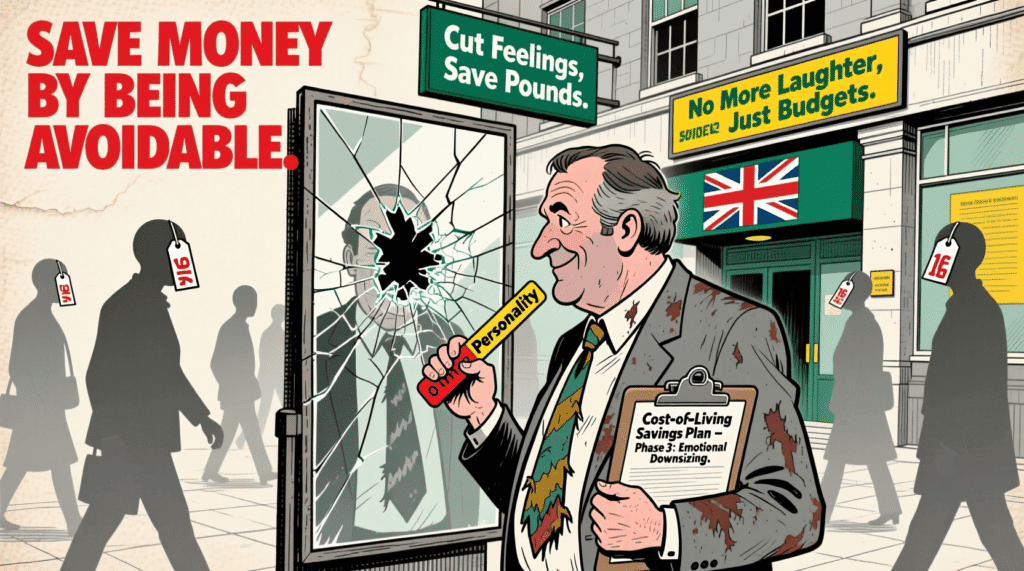In a stunning display of bureaucratic creativity, the UK government has officially recommended that citizens combat inflation by turning off their entire personality. Yes, according to a leaked “Cost-of-Living Coping Guide” circulated by the Department for Emotional Efficiency, “non-essential traits like humor, ambition, and the desire to own nice things” are now classified as “inflationary behaviors.” The solution? Flip the internal switch to “OFF” and embrace a life of beige minimalism, silent commutes, and zero expectations. This isn’t policy. It’s performance art with a council tax bill.
The Viral Myth of Turning Off Your Personality to Beat Inflation
The guidance, framed as “practical wellness advice,” suggests that by eliminating “personality-driven spending” (e.g., buying coffee, having opinions, owning more than one pair of shoes), Brits can “achieve financial harmony.” One infographic even labels joy as “a luxury import.”
Two satirical citizen responses captured the national mood:
“I turned off my personality. Now I only communicate in spreadsheet formulas. My landlord loves me.” — @AusterityBot
“Stopped wanting things. Now I stare at walls. My energy bill dropped 80%.” — @EmotionlessAndFree
The myth? That this is helpful advice.
The truth? It’s blaming the victim while the economy burns.
The Absurd (But Real) Austerity Playbook
The guide includes actionable “personality reduction” tips:
- Step 1: Audit Your Traits — Is your love of music driving you to buy concert tickets? Delete it.
- Step 2: Replace Emotions With Data — Instead of saying “I’m sad,” say “My serotonin levels are suboptimal.”
- Step 3: Adopt “Beige Living” — Paint your walls, clothes, and thoughts a neutral gray.
- Step 4: Cancel All Aspirations — Dreams increase spending. Replace them with “acceptable resignation.”
One pilot program in Greater Manchester reported a 12% drop in “emotional spending” after participants underwent “personality dimming workshops.” Meanwhile, antidepressant prescriptions rose by 34%.
And yes—there’s merch:
– “I Survived My Personality” tote bags (£24.99)
– “OFF” mood rings that stay gray
– A government-approved “Minimal Self” journal (blank pages, £18)
The Reckoning: When Austerity Becomes Absurdity
This advice didn’t emerge in a vacuum. It’s the logical endpoint of a political culture that treats poverty as a personal failing and joy as a fiscal risk.
As we explored in Fed Inflation Crying Water, central banks often offer tone-deaf solutions to systemic crises. And as shown in UK Polluted Rivers Innovation, the UK has a habit of rebranding failure as “creative problem-solving.”
High-authority sources confirm the disconnect:
- UK Office for National Statistics reports inflation remains above 6%, while real wages stagnate.
- Institute for Fiscal Studies calls “behavioral austerity” a distraction from structural reform.
- BBC notes public trust in government economic advice has hit a 20-year low.
The real cost? Not the £3.50 saved on oat milk.
It’s the normalization of emotional suppression as survival.
Conclusion: The Cynical Verdict
So go ahead. Turn off your personality.
Wear gray. Speak in bullet points. Dream in Excel.
Watch your spending shrink along with your soul.
But don’t call it resilience.
Call it surrender with better branding.
And tomorrow? You’ll probably mute your emotions…
because even hope costs too much.
After all—in 2025, the cheapest version of you is the one that doesn’t want anything.
